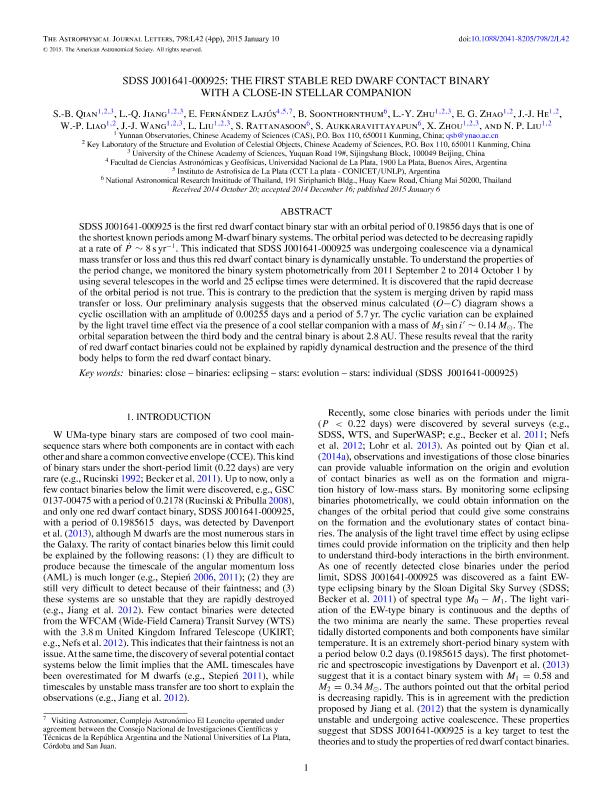Mostrar el registro sencillo del ítem
dc.contributor.author
Qian S. B.
dc.contributor.author
Jiang, L.Q.
dc.contributor.author
Fernandez Lajus, Eduardo Eusebio

dc.contributor.author
Soonthornthum B.
dc.contributor.author
Zhu, L. Y.
dc.contributor.author
Zhao, E. G.
dc.contributor.author
He, J. J.
dc.contributor.author
Liao, W. P.
dc.contributor.author
Wang, J. J.
dc.contributor.author
Liu, L.
dc.contributor.author
Rattanasoon, S.
dc.contributor.author
Aukkaravittayapun, S.
dc.contributor.author
Zhou, X.
dc.contributor.author
Liu, N. P.
dc.date.available
2017-01-11T20:16:54Z
dc.date.issued
2015-01
dc.identifier.citation
Qian S. B.; Jiang, L.Q.; Fernandez Lajus, Eduardo Eusebio; Soonthornthum B.; Zhu, L. Y. ; et al.; SDSS J001641-000925: the First Stable Red-dwarf contact binary with a close-in stellar companion; IOP Publishing; Astrophysical Journal Letters; 798; 2; 1-2015; 42-45
dc.identifier.issn
2041-8205
dc.identifier.uri
http://hdl.handle.net/11336/11157
dc.description.abstract
SDSS J001641-000925 is the first red-dwarf contact binary star with an orbital period of 0.19856 days that is one of the shortest known periods among M-dwarf binary systems. The orbital period was detected to be decreasing rapidly at the rate of dP/dt ~ 8 s/yr. This indicated that SDSS J001641-000925 was undergoing coalescence via a dynamical mass transfer or loss and thus this red-dwarf contact binary is dynamically unstable. To understand the properties of the period change, we monitored the binary system photometrically from September 2, 2011 to October 1, 2014 by using several telescopes in the world and 25 eclipse times were determined. It is discovered that the rapid decrease of the orbital period is not true. This is contrary to the prediction that the system is merging driven by rapid mass transfer or loss. Our preliminary analysis suggests that the Observed-Calculated (O-C) diagram shows a cyclic oscillation with an amplitude of 0.00255 days and a period of 5.7 years. The cyclic variation can be explained by the light-travel time effect via the presence of a cool stellar companion with a mass of M3 sin i′ ~ 0.14M⊙. The orbital separation between the third body and the central binary is about 2.8AU. These results reveal that the rarity of red-dwarf contact binaries could not be explained by rapidly dynamical destruction and the presence of the third body helps to form the red-dwarf contact binary.
dc.format
application/pdf
dc.language.iso
eng
dc.publisher
IOP Publishing

dc.rights
info:eu-repo/semantics/openAccess
dc.rights.uri
https://creativecommons.org/licenses/by-nc-sa/2.5/ar/
dc.subject
Close Binaries
dc.subject
Eclipsing Binaries
dc.subject
Sdss J001641-000925 (Estrella)
dc.subject
Evolution of Stars
dc.subject.classification
Astronomía

dc.subject.classification
Ciencias Físicas

dc.subject.classification
CIENCIAS NATURALES Y EXACTAS

dc.title
SDSS J001641-000925: the First Stable Red-dwarf contact binary with a close-in stellar companion
dc.type
info:eu-repo/semantics/article
dc.type
info:ar-repo/semantics/artículo
dc.type
info:eu-repo/semantics/publishedVersion
dc.date.updated
2017-01-11T13:26:59Z
dc.journal.volume
798
dc.journal.number
2
dc.journal.pagination
42-45
dc.journal.pais
Estados Unidos

dc.description.fil
Fil: Qian S. B.. Chinese Academy Of Sciences; República de China
dc.description.fil
Fil: Jiang, L.Q.. Chinese Academy Of Sciences; República de China
dc.description.fil
Fil: Fernandez Lajus, Eduardo Eusebio. Consejo Nacional de Investigaciones Científicas y Técnicas. Centro Científico Tecnológico la Plata. Instituto de Astrofísica de la Plata; Argentina. Universidad Nacional de la Plata. Facultad de Ciencias Astronómicas y Geofísicas; Argentina
dc.description.fil
Fil: Soonthornthum B.. National Astronomical Research Insititude of Thailand; Tailandia
dc.description.fil
Fil: Zhu, L. Y. . Chinese Academy Of Sciences; República de China
dc.description.fil
Fil: Zhao, E. G. . Chinese Academy Of Sciences; República de China
dc.description.fil
Fil: He, J. J. . Chinese Academy Of Sciences; República de China
dc.description.fil
Fil: Liao, W. P. . Chinese Academy Of Sciences; República de China
dc.description.fil
Fil: Wang, J. J. . Chinese Academy Of Sciences; República de China
dc.description.fil
Fil: Liu, L.. Chinese Academy Of Sciences; República de China
dc.description.fil
Fil: Rattanasoon, S.. National Astronomical Research Insititude of Thailand; Tailandia
dc.description.fil
Fil: Aukkaravittayapun, S.. National Astronomical Research Insititude of Thailand; Tailandia
dc.description.fil
Fil: Zhou, X.. Chinese Academy Of Sciences; República de China
dc.description.fil
Fil: Liu, N. P. . Chinese Academy Of Sciences; República de China
dc.journal.title
Astrophysical Journal Letters
dc.relation.alternativeid
info:eu-repo/semantics/altIdentifier/doi/http://dx.doi.org/10.1088/2041-8205/798/2/L42
dc.relation.alternativeid
info:eu-repo/semantics/altIdentifier/url/http://iopscience.iop.org/article/10.1088/2041-8205/798/2/L42/meta
Archivos asociados
